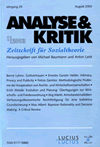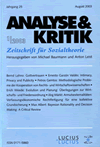Suchergebnisse
"Max Albert"
Titel: Critical Rationalism and Scientific Competition
Autor: Max Albert
Seite: 247-266
Abstract: This paper considers critical rationalism under an institutional perspective. It argues that a methodology must be incentive compatible in order to prevail in scientific competition. As shown by a formal game-theoretic model of scientific competition, incentive compatibility requires quality standards that are hereditary: using high-quality research as an input must increase a researcher's chances to produce high-quality output. Critical rationalism is incentive compatible because of the way it deals with the Duhem-Quine problem. An example from experimental economics illustrates the relevance of the arguments.
Titel: Bayesian Rationality and Decision Making: A Critical Review
Autor: Max Albert
Seite: 101-117
Abstract: Bayesianism is the predominant philosophy of science in North-America, the most important school of statistics world-wide, and the general version of the rational-choice approach in the social sciences. Although often rejected as a theory of actual behavior, it is still the benchmark case of perfect rationality. The paper reviews the development of Bayesianism in philosophy, statistics and decision making and questions its status as an account of perfect rationality. Bayesians, who otherwise are squarely in the empiricist camp, invoke a priori reasoning when they recommend Bayesian methods - a recommendation that is not justified by their own standards.

Property-Owning Democracy
2013 (35) Heft 1
Guest-Editors: Francis Cheneval / Christoph Laszlo
Editorial
In recent years, ’property-owning democracy’ (POD), defined by widespread ownership of productive assets, has become one of the key-factors in the assessment of the institutional design implied in John Rawls’s theory of justice. The wider implications of this inquiry also engage scholars who do not subscribe to Rawls’s conception of justice but are broadly interested in normative questions of political economy and the basic structure of a just polity. In the course of this debate, the in...

Social Dimensions of Science
2010 (32) Heft 2
Editorial
The research program of Social Epistemology developed from a critique on philosophical epistemology around thirty years ago. Since then it has attracted an ever growing attention, mainly, however, among philosophers. But social epistemology offers also prolific alignments for the social sciences. The starting point of Social Epistemology is the elementary fact that a large proportion of our knowledge is acquired not by our own autonomous exploration according to some ideal standards but by relyi...